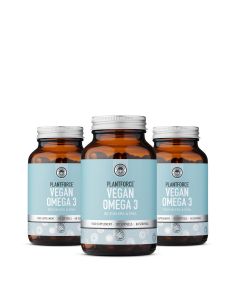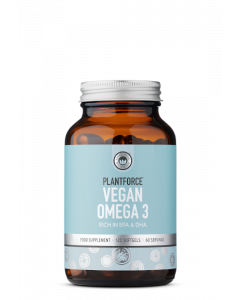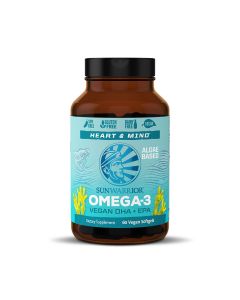- Shipped today!
- Free shipping from € 45
- Postpay possibility
- Review score 9.4
- Earn reward points
- Shipped today!
- Free shipping from € 45
- Postpay possibility
- Review score 9.4
- Earn reward points
- Home
- Superfoods & Mushrooms
- Oils
- Algae Oil (Vegan EPA & DHA)


Plent Algae Oil
Algae oil is an exceptional source of the vital long-chain fatty acids eicosapentaenoic acid (EPA) & docosahexaenoic acid (DHA). It has the benefit of being grown in controlled environments such as fermentation tanks, resulting in a high-quality, environmentally friendly, sustainable oil that is free from contaminants.
Unfortunately, there are no dietary sources of EPA or DHA for vegans. Since the body cannot synthesise EPA and DHA efficiently, supplementation is the only reliable route. All our algae oil batches undergo advanced testing procedures to ensure product quality and our commitment to putting the consumer first.
Is Algae Oil vegan?
Yep! Algae oil is sourced completely from algae, which is an aquatic plant that grows in ponds or other freshwater bodies of water. This source of EPA & DHA is not only vegetarian and vegan, but it actually requires less processing and is, therefore, more environmentally friendly.
What's the difference between Algae and Fish Oil?
This depends on the specific product. Generally speaking, however, there is little differences in the fatty acid profile (EPA & DHA) of these sources, and algae is a perfectly suitable alternative for vegetarians and vegans.
Key Health Aspects of Algae Oil
Algae oil and more specifically omega-3 fatty acids play various roles in the body and have many healthful properties, below is a list of the best available evidence.
Inflammation
Strong evidence for anti-inflammatory properties (Source: NCBI).
Cognitive function
Protects against cognitive decline in adults: better performance on tests of nonverbal reasoning and mental flexibility, working memory, and vocabulary with higher DHA status (Source: NCBI). Healthy brain development in children: Intervention studies have shown improved maternal DHA nutrition decreases the risk of poor visual development (Source: NCBI).
Muscle function
Omega-3 fatty acids enhance protein synthesis -Omega-3 seems to have anabolic properties in healthy young and middle-aged adults (Source: NCBI).
EPA & DHA can reduce delayed onset muscle soreness: the ability to increase training frequency in untrained men (Source: NCBI).
Mood and Anxiety
Can improve mood (Source: NCBI). Lower anxiety (Source: NCBI) & inflammatory markers (Source: NCBI): potential anxiolytic effects in those without an anxiety disorder diagnosis.
EU-Approved Health Claims
The supplement industry is not as tightly regulated as food, unfortunately. That is why whenever possible, you should look to see if the compound in question has EU-approved health claims. Here are some examples of the approved health claims for omega-3 fatty acids
- Combined intake of 250 mg of EPA and DHA per day contributes to the normal function of the heart.
- DHA contributes to the maintenance of normal vision at 250 mg per day.
- DHA contributes to maintenance of normal brain function at 250 mg per day.
- DHA contributes to normal visual development of infants up to 12 months of age at 100 mg per day.
- DHA contributes to normal development of the brain and eye of the fetus and breastfed infants at 200 mg a day.
What are Omega-3 Fatty Acids?
Eicosapentaenoic acid (EPA)
EPA supports the local inflammatory responses, for example, if you twisted your ankle and it became inflamed, EPA would exert its effect locally at the ankle joint. EPA also contributes to maintaining normal circulating fatty acid concentrations and regulating mood.
Docosahexaenoic acid (DHA)
DHA is incorporated into our cell membranes which provide structure and function. DHA also supports brain function and eye health. It is imperative for pregnant and breastfeeding mothers to supplement or obtain adequate DHA through fortified products (an additional 200 mg/day on top of the diet) to support the eye and brain development of the fetus.





